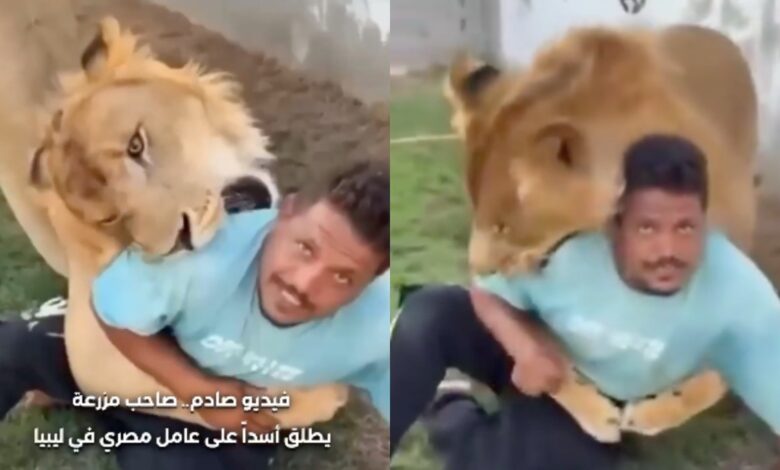बेदर्द मालिक ने सेवक पर छोड़ा शेर, व्यक्ति कांपते हुए वीडियो में दिखा; लीबिया ने श्रमिक पर जानवर छोड़ दिया, आदमी ने TSTF में हड़कंप मचाया।

A man has been arrested in Libya on charges of leaving his pet lion with an employee from Egypt. The incident sparked immense anger on social media, leading to the man’s apprehension and multiple charges being brought against him.
### What Does the Viral Video Show?
In the video that circulated widely, a lion can be seen engaging in a struggle with a man. The lion makes several attempts to bite the individual, who appears helpless while trying to shield himself from the animal’s claws. Surprisingly, he maintains a calm demeanor and seems to plead with his employer during the ordeal.
The man from Libya later claimed that the entire scenario was meant to be a joke; however, the court viewed it as a blatant abuse of power. The prosecutor indicated that this conduct posed a significant threat to public safety.
### Responses on Social Media
The video quickly garnered attention across social media platforms, provoking a barrage of reactions from users expressing their outrage. One viewer noted that despite the victim appearing calm and occasionally smiling, which suggested he wasn’t fearful, many others pointed out how the situation could have escalated into a dangerous encounter within moments.
### Farmer Faces Charges
According to reports, the arrested man is a farmer, and he faces serious accusations including endangering human life, instilling terror among citizens, and causing both mental and social harm. Furthermore, he is also accused of violating religious and civil laws.
The public outcry over this incident raises troubling questions about the ethics of keeping wild animals as pets. Many people argue that such ownership requires a high level of responsibility and awareness regarding the potential dangers involved. The very fact that a lion was used in what was supposed to be a lighthearted prank demonstrates a severe lack of judgment on the part of the individual involved.
### The Ethical Debate Surrounding Wild Animal Ownership
The ownership of exotic animals, especially predators like lions, remains a contentious topic globally. Advocates for animal rights frequently argue against the captivity of wild animals, emphasizing the mental and emotional distress they experience when removed from their natural habitats.
Moreover, many countries have now begun to enact stricter laws regarding the ownership of such animals, reflecting a growing understanding of the need for better regulations. Incidents like this highlight the necessity of such laws, emphasizing the risks posed to both humans and the animals involved.
### Psychological Impact on Animals
Wild animals, including lions, are instinctively driven by their nature. They require space, social structures, and environments that mimic their natural habitats. Captive settings often lead to various psychological issues, including stress, aggression, and repetitive behaviors. The viral video could serve as a glaring reminder of the consequences of disregarding the intrinsic needs of such animals.
In many cases, individuals who choose to keep wild animals as pets may lack the awareness or knowledge of the complexities involved in their care. The notion of owning a lion might seem appealing as an exotic status symbol, but it is crucial to recognize the deeper ethical responsibilities associated with that ownership.
### Societal Implications
The widespread anger directed at the farmer reveals a collective societal disapproval of animal cruelty and irresponsibility. It underscores the importance of educating the public about the risks associated with wild animal ownership and the ethical considerations that should guide such decisions.
Additionally, the incident has sparked conversations on social media regarding the responsibilities of pet owners—particularly when it comes to exotic animals. Many users have called for more extensive legal frameworks to regulate ownership practices and to impose stricter penalties for those who violate animal welfare laws.
### A Call for Better Regulations
As society increasingly recognizes the need for stricter regulations around exotic animal ownership, conversations about public safety cannot be ignored. This not only involves ensuring the well-being of the animals but also safeguarding the communities where they reside.
Greater awareness campaigns could significantly contribute to reducing incidents like the one in Libya. Educating potential owners about the realities of animal care, the requirements for proper habitat, and the potential dangers can alleviate risks and prevent future abuse.
### Conclusion
The arrest of the man in Libya serves as more than just an isolated incident; it is a reflective lens on the broader issues surrounding the ownership of exotic animals. As social media continues to amplify conversations around animal rights and responsibilities, it is evident that there is a pressing need for societal reform, both at the legislative and community levels.
Future discussions surrounding animal ownership should prioritize not only the rights of animals but also the safety of human populations. This incident may prove to be a significant turning point in the fight against exotic animal cruelty and irresponsibility, prompting communities and policymakers alike to re-evaluate existing laws and protections.





